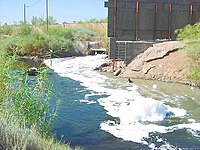
Photo from wikipedia
Abstract The Electro-Fenton (EF) process is one of the promising advanced oxidation processes (AOPs) for environmental remediation. The H2O2 yield of EF process largely determines its performance on organic pollutants… Click to show full abstract
Abstract The Electro-Fenton (EF) process is one of the promising advanced oxidation processes (AOPs) for environmental remediation. The H2O2 yield of EF process largely determines its performance on organic pollutants degradation. Conventional Pd-catalytic EF process generates H2O2 via the combination reaction of anodic O2 and cathodic H2. However, the relatively expensive catalyst limits its application. Herein, a hybrid Pd/activated carbon (Pd/AC)-stainless steel mesh (SS) cathode (PACSS) was proposed, which enables more efficient H2O2 generation. It utilizes AC, the support of Pd catalyst, as part of cathode for H2O2 generation via 2-electron anodic O2 reduction, and SS serve as a current distributor. Moreover, H2O2 could be catalytically decomposed upon AC to generate highly reactive ·OH, which avoids the use of Fe2+. Compared with conventional Pd catalyst, H2O2 concentration obtained by PACSS cathode is 248.2% higher, the O2 utilization efficiency was also increased from 3.2% to 10.8%. Within 50 min, 26.3%, 72.5%, and 94.0% H2O2 was decomposed by Pd, AC, and Pd/AC. Fluorescence detection results implied that Pd/AC is effective upon H2O2 activation for ·OH generation. Finally, iron-free EF process enabled by PACSS cathode was examined to be effective for reactive blue 19 (RB19) degradation. After continuous running for 10 cycles (500 min), the PACSS cathode was still stable for H2O2 generation, H2O2 activation, and RB19 degradation, showing its potential application for organic pollutants degradation without increase in the running cost.
Journal Title: Chinese Journal of Chemical Engineering
Year Published: 2021
Link to full text (if available)
Share on Social Media: Sign Up to like & get
recommendations!